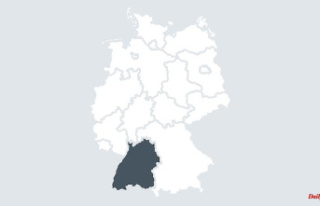So far, Sars-CoV-2 has surprised people with its versatility. In India, a new subvariant of omicron is emerging: BA.2.75 dominates the infection process there. The number of cases is also increasing. But what does that mean for the rest of the world?
A new omicron subvariant of Sars-CoV-2 is on the rise in India. It bears the name BA.2.75, but is unofficially called "Centaurus" (centaur). Most recently, about two-thirds of the new coronavirus cases in the subcontinent were attributed to BA.2.75, virologist Shahid Jameel reported. In the meantime, the new variant has also been discovered in more than 20 countries worldwide.
At the beginning of July, researchers had already spoken out about the emergence of the new subvariant in India and warned of a possible rise to global dominance. In the weeks that followed, however, the feared strong growth outside of India did not materialise. On the subcontinent, however, BA.2.75 now dominates. The number of new infections recorded is increasing, the increase in hospital stays and deaths is still limited.
BA.2.75 appears to have a "quite significant" transmission advantage over BA.5 in India, concluded Tom Wenseleers, an evolutionary biologist at the Catholic University of Leuven in Belgium who modeled the rise of Centaurus, according to the journal Nature. "This would definitely trigger a wave of infections," he said.
But why the Centaurus variant is so successful in India remains a mystery. Previous studies have not been able to identify any major difference between BA.2.75 and the omicron variant BA.5, which is dominant in the rest of the world. Both have the ability to circumvent immunity against earlier variants acquired through infection or vaccination - which explains their spread in countries with high vaccination or recovery rates. But otherwise?
The virologist Trevor Bedford from the University of Washington even recently found that BA.2.75 had certain starting difficulties compared to other subvariants. For example, their infection rate, expressed in the R value, was lower in the USA from the start than was the case with the BA.5 variant, he wrote on Twitter. This indicates that BA.2.75 "will trigger a smaller epidemic in the United States than what we experienced with BA.5," said Bedford. However, a possible seasonal effect has not yet been taken into account.
But why then is BA.2.75 gaining complete dominance in India? A mystery from the point of view of some researchers, there are only guesses so far. A note: the situation in India is different than in the rest of the world. Because the country had not previously seen a pronounced wave through the subline BA.5. The fact that BA.2.75 is now ahead of it could be due to the massive delta wave in India in 2021. According to a preprint by Chinese researchers, BA.2.75 succeeds better than BA.5 in bypassing the immune response of people who have already been infected with Delta - a clear competitive advantage.
Outside of India, however, this advantage of the Centaurus variant over BA.5 might not matter as much. "We're getting to a point where these variants compete with each other and are almost equal," says virologist Jameel. "I think people who had BA.5 will not have breakthrough infections with BA.2.75 and vice versa."
BA.2.75 has hardly taken place in Germany so far. In Germany, "since week 25/2022, a total of five genome sequences of this subline have been identified in the sample," wrote the Robert Koch Institute in its latest weekly report. A growth advantage of BA.2.75 compared to the variants BA.4 and BA.5, which are dominant in Germany, is currently unknown.
Virologist Wenseleers believes that BA.2.75 could "beat" the previous variants BA.4 and BA.5 in Europe, as he wrote on Twitter. But this could be difficult with another omicron subvariant: BA.46. This would provide "some competition" for BA.2.75 in Europe, the Middle East and North America. Federal Minister of Health Karl Lauterbach shared Wenseleers' tweet with the comment: "Unfortunately, the corona pandemic is not over yet."












